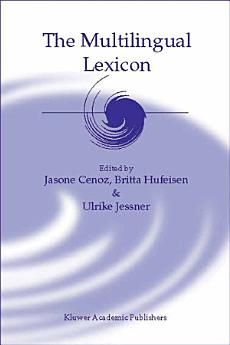The Multilingual Lexicon
এই ইবুকখনৰ বিষয়ে
Recent research on third language acquisition and trilingualism has made clear that most multilingual studies actually deal with vocabulary learning or the lexicon. So far books on the mental lexicon have mainly been concerned with two languages in contact. This book is unique because it explores the multilingual lexicon by providing insights from research studies conducted in psycholinguistics, applied linguistics and neurolinguistics. It goes beyond the use of two languages and thus concentrates on a new and developing area in linguistic research. The different perspectives included in this volume provide a link to the mainstream work on the lexicon and vocabulary acquisition and will stimulate further debate in these areas and in the study of multilingualism.







